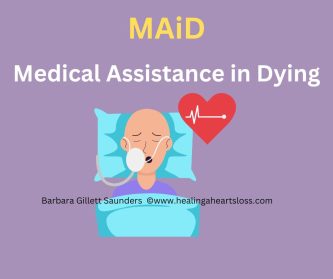I want to share some information that I had not completely pulled together in my mind until watching a recent seminar. The video included with this seminar is called “Her Last Project.”
After watching the video, I participated in the discussion that followed. I share some of the concerns and ideas that were discussed with the intent of providing food for though; not a debate or anything else.
In short, if an individual has a grievous irremediable (permanent) illness which is not treatable by means that are acceptable to the individual, then they can be considered for MAiD. Along with this is an advanced state of decline and/or intolerable suffering as mentioned by Dr. Anthony Truong Swan.
A major component of the video included the process and introduction of organ donation in conjunction with MAiD. Dr. Swan stated that few people would qualify to have their organs donated since some of the requirements include, being under the age of eighty, no HIV positive test and no cancer. Many of the people who choose MAiD have some of the above.
As a society, there are many who are supporters of organ donation. The person in the video was a doctor herself and wanted to help save lives. She made arrangements for MAiD and organ donation well in advance of her body deteriorating with ALS.
The story continued with her saying good bye to family and friends and showed several components necessary to honour her wishes. Since a few organs were being donated the MAiD procedure had to be done in the hospital.
I had not considered organ donation along with MAiD prior to this seminar. This is the food for thought part. Consider all the moving pieces here,
- choosing to end your current and potential suffering
- give your usable organs to save a few lives
- say good bye to family and friends while you can still function and your organs are viable
- having the discussion with medial professionals to make this happen
- having the internal self talk about what you are going to do.
- Getting your head around the whole thing is huge
Pause for a moment and ponder the existential suffering, which could be worrying about control over your body, wasting away, not wanting to go into palliative care, not wanting others to take care of your basic needs, losing your dignity and what ever else you can think of for this situation. What about not wanting your family to watch you suffer?
This is a contentious topic for many people.
What would you choose to do in this situation or something similar? We are talking about life and death. It is happening and we need to be having open conversations with our families about our wishes while we can.
All my best,
Barbara Gillett Saunders

